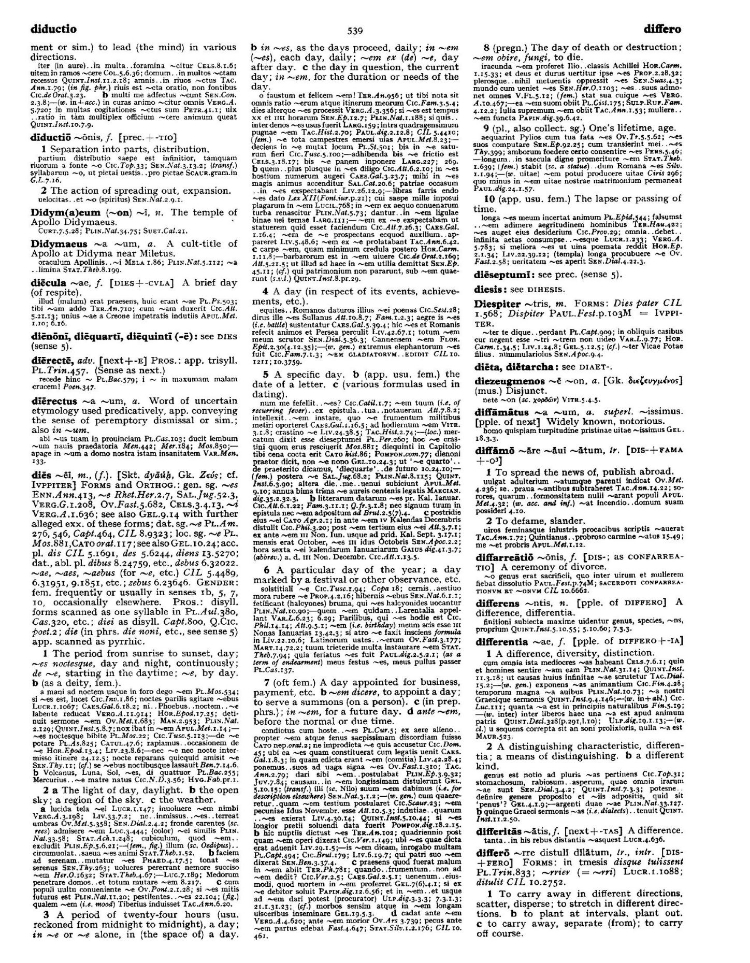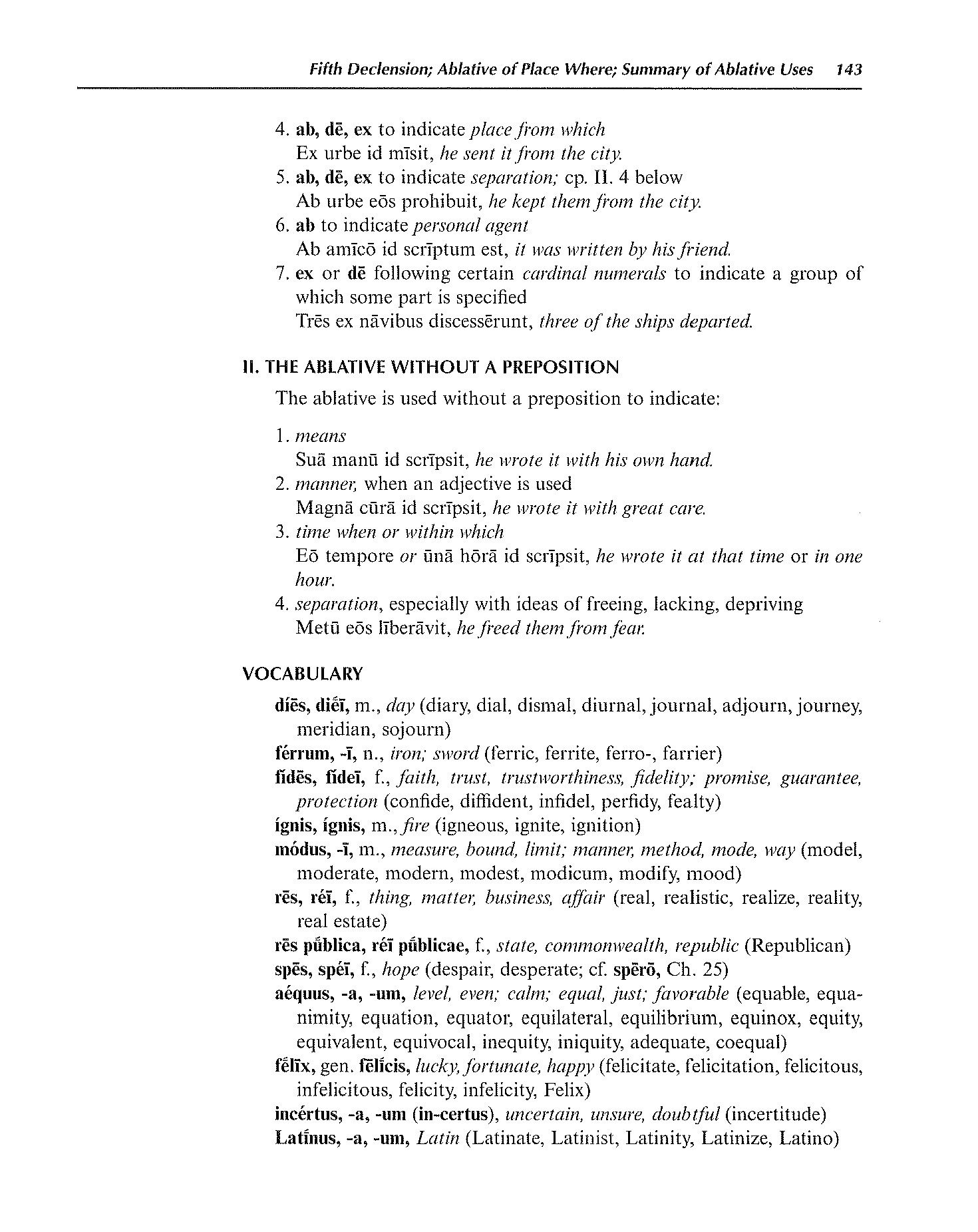
page_listing.tpl
page_subListingDetails.tpl
sub_listingDetails_style1.tpl
sub_listingDetails.title.tpl
diēs day
diēs is a Latin Noun that primarily means day.
Definitions for diēs
Wheelock's Latin
Noun
- 1
day
English derivatives:
diary dial dismal diurnal journal adjourn journey meridian sojourn
Oxford Latin Dictionary
Noun
- 1
The period from sunrise to sunset, day; ~es noctesque, day and night, continuously; de ~e, starting in the daytime; ~e, by day. (b) (as a deity, fem.).
- 2
(a) The light of day, daylight. (b) the open sky; a region of the sky. (c) the weather.
- 3
A period of twenty-four hours (usu. reckoned from midnight to midnight), a day; in ~e or ~e alone, in (the space of) a day. (b) in ~es, as the days proceed, daily; in ~em (~es), each day, daily; ~em ex (de) ~e, day after day. (c) the day in question, the current day; in ~em, for the duration or needs of the day.
Sentences with diēs
Latin to English
Eō diē multās rēs cum spē parāvērunt.Compare On that day they prepared many things hopefully.
Quīnque diēbus Cicerō rem pūblicam ē perīculō ēripiet.Compare In five days Cicero will rescue the republic from danger.
Eīs diēbus solitī sumus Athēnīs esse.Compare In those days we were accustomed to be at Athens.
Eōdem diē vēnērunt.Compare They came on the same day.
Cum quattuor diēs nāvigāssēmus, subitō maxima tempestās coorta est.Compare When we had sailed four days, suddenly a very great storm arose.
Idus Martius adsum reus iubeo, qui dies novus magistratus ineo honor.Compare He ordered the defendant to be present on the Ides of March, on which day the new magistrates were about to enter upon their office.
Eo, et post paucus dies alius decem legatus sui cum adduco.Compare They went, and a few days afterwards brought ten other ambassador with them.
Negāvit sē velle in istā terrā multos diēs remanēre.Compare He said that he did not want to stay in that country of yours many days.
Declension table for diēs
Cactus2000
| Singular | Plural | |
| Nom. | diēs | diēs |
| Gen. | diēī | diērum |
| Dat. | diēī | diēbus |
| Acc. | diem | diēs |
| Abl. | diē | diēbus |
Data sources
Notes
- Definitions
- Frederick M. Wheelock, Wheelock's Latin, 6th ed., rev. Richard A. LaFleur (New York, NY: HarperCollins Publishers, 2005): 143.
- P. G. W. Glare, Oxford Latin Dictionary, Vols. 1-8 (Oxford: Clarendon Press, 1982): 539.
- Word frequencies
- Christopher Francese, "Latin Core Vocabulary," Dickinson College Commentaries, last modified 2014, http://dcc.dickinson.edu.
- Paul B. Diederich, The Frequency of Latin Words and Their Endings, PhD diss., (Columbia University, 1939).
- Louis Delatte, Suzanne Govaerts, Joseph Denooz, and Etienne Evrard, Dictionnaire fréquentiel et index inverse de la langue latine [Frequency Dictionary and Inverse Index of the Latin Language] (Liège, Belgium: Laboratoire d'analyse statistique des langues anciennes de l'Université de Liège [L.A.S.L.A.], 1981): 119.
Bibliography
Allen, Joseph H. Allen and Greenough's New Latin Grammar for Schools and Colleges: Founded on Comparative Grammar. Edited by James B. Greenough, George L. Kittredge, Albert A. Howard, and Benjamin L. D'Ooge. Boston, MA: Ginn & Company, 1903.
Crystal, David. A Dictionary of Linguistics and Phonetics. 6th ed. Oxford, UK: Blackwell Publishing, 2008.
Delatte, Louis, Suzanne Govaerts, Joseph Denooz, and Etienne Evrard. Dictionnaire fréquentiel et index inverse de la langue latine [Frequency Dictionary and Inverse Index of the Latin Language]. Liège, Belgium: Laboratoire d'analyse statistique des langues anciennes de l'Université de Liège (L.A.S.L.A.), 1981.
Diederich, Paul B. The Frequency of Latin Words and Their Endings. PhD diss., Columbia University, 1939.
Francese, Christopher. "Latin Core Vocabulary." Dickinson College Commentaries. Last modified 2014. http://dcc.dickinson.edu/latin-vocabulary-list.
Gildersleeve, Basil L., and Gonzales Lodge. Gildersleeve's Latin Grammar: Third Edition, Revised, and Enlarged. 3rd ed. London, England: Macmillan and Co., 1903.
Glare, Peter G.W. Oxford Latin Dictionary. Vols. 1-8. Oxford, England: Clarendon Press, 1982.
Krüger, Bernd. "Latin Conjugation Tables." Cactus2000. Accessed May 5, 2023. https://latin.cactus2000.de/index.en.php.
Pierson, Nick. "Sound of Text." Accessed October 26, 2019. https://soundoftext.com.
Wheelock, Frederick M. Wheelock's Latin. 6th ed. Revised by Richard A. LaFleur. New York, NY: HarperCollins Publishers, 2005.
Wiktionary Contributors. "Victionarium." Wikimedia Foundation, Inc. Updated March 18, 2019. https://la.wiktionary.org/wiki/Victionarium:Pagina_prima.
Citation
Chicago (17th ed.)
Allo Contributors. "diēs, diēī (n.) - Latin Word Definition." Allo Latin Dictionary. Last modified . Accessed February 20, 2026. http://ancientlanguages.org/latin/dictionary/dies-diei.
Entry created on . Last updated on .







